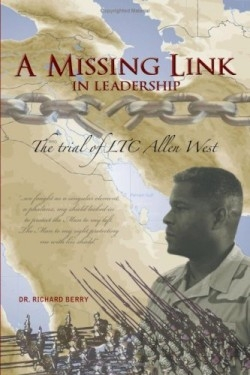A Missing Link in Leadership
The Trial of LTC Allen West
Dr. Richard Berry a former instructor at the United States Military Academy and Chief Strategy Officer at the Asia-Pacific Center for Security Studies in Hawaii offers his views on leadership theory as it relates to the military in this thought-provoking and well-researched study.
Drawing upon his rich background in the military and on Wall Street Berry who holds a doctorate in organizational culture and leadership uses the case of Lieutenant Colonel Allen West to prove his complex thesis that current leadership theory is incomplete due not only to the absence of emotions but independent thought and intuition. The subject in question is a decorated war hero who was charged with felony offences by the United States Army for actions he undertook while serving in Tikrit Iraq in the summer of 2003.
The book opens with a richly detailed account of the event that led to West’s subsequent charges. Berry’s strongest asset is this attention to detail which is evident from the very beginning. He brings a strong sense of reality and most importantly reliability to the book. Readers first meet LTC West as he is brought in to interrogate a captured Iraqi prisoner who may have information on a forthcoming attack on American soldiers in the area. When conventional questioning tactics fail to bring to light any details about the attack West opts to use force against the prisoner by holding his head against a table and drawing his weapon. West claims that he will shoot the prisoner in the head should the man refuse to reveal his secret. West then fires his weapon in a container filled with sand to scare the prisoner into speaking which he ultimately does preventing the planned assault. These actions go against the code of conduct and two weeks later West is charged with a felony by the army just before he becomes eligible for retirement.
With the event now clearly depicted Berry divides the remainder of the book into three sections which detail the trial from various perspectives. Readers are left to make their own judgments about the matter in question and the ideologies employed by the military. While Berry’s views are evident from the onset he provides enough information to allow his audience to make up their own minds about whether West’s actions were right or wrong.
Though many will surely disagree with the actions of West viewing it instead as a violation of the Charter of Human Rights and Geneva Convention readers will surely understand and appreciate the sensitivity of the matter and the anger present in many who feel West made the correct move.
Berry’s prose is articulate and extremely well informed leading to an engaging read that will have readers questioning their own thoughts and beliefs on the subject.
Disclosure: This article is not an endorsement, but a review. The publisher of this book provided free copies of the book and paid a small fee to have their book reviewed by a professional reviewer. Foreword Reviews and Clarion Reviews make no guarantee that the publisher will receive a positive review. Foreword Magazine, Inc. is disclosing this in accordance with the Federal Trade Commission’s 16 CFR, Part 255.

